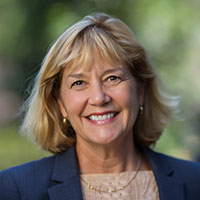Obesity prevention education has positive impact on college students, study finds
December 19, 2016
Young adulthood is one of several life stages during which people are prone to gain unwanted weight. This is especially true for first- and second-year college students, for whom high levels of stress and limited opportunities to eat and exercise appropriately may exist.
A new study, led by a professor at the UNC Gillings School of Global Public Health, evaluated a 24-month weight-gain prevention program aimed at reducing the expected increases in weight and body mass index (BMI) among young adults attending two-year community colleges and found that students in the intervention group were less likely than those in the control group to become overweight or obese.
Leslie Lytle, PhD, professor and chair of health behavior at the Gillings School, led Choosing Healthy Options in College Environments and Settings (CHOICES), a randomized control trial that tested technology-based approaches to help such students avoid weight gain and the related adverse health outcomes. Her research team’s findings were published online Dec. 6 in the American Journal of Preventive Medicine.
From 2011 to 2013, Lytle and colleagues engaged 441 students from three community colleges in Minnesota. Members of the intervention group took a one-credit college course on healthy weight behaviors and participated in a social networking and social support website throughout the 24-month period.
Over the course of the study, there was an 8 percent reduction in the prevalence of overweight and obesity among members of the intervention group. Members of this group also were three times more likely to transition to a healthy weight by the end of the trial, compared with members of the control group. There was no statistically significant difference in body mass index or weight between groups at the end of the trial, however.
“We were encouraged that the program appeared to have a positive impact upon young adults’ weight status, particularly since the approach involved channels that are readily available to college students,” Lytle said. “Using a one-credit class and a social networking website as our intervention helped to ensure that dissemination of the program to other college populations would be relatively easy.”
Study co-authors from University of Minnesota at Minneapolis include Melissa Laska, PhD, Jennifer Linde, PhD, Stacey Moe, MPH, Peter Hannan, MStat, and Darin Erickson, PhD, in the Division of Epidemiology; and Marilyn Nanney, PhD, in the Department of Family Medicine and Community Health.
The research was supported through a grant from the National Heart, Lung and Blood Institute. Additional salary support was provided by the National Cancer Institute.
Share
Gillings School of Global Public Health contact: David Pesci, director of communications, (919) 962-2600 or dpesci@unc.edu

